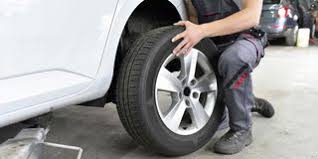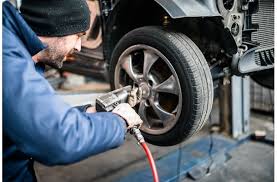How long should my truck tires last?
Truck tires do wear out eventually. However, that should not be for a long time after you buy them, assuming you drive normally. But what kind of life should you reasonably expect from your truck tires and what can you do to extend that life?
Tire Construction
For most trucks, both pickups and commercial, the tires are usually made of three or four steel belts under a single ply that’s a steel body under the tire itself. The intent is that these tires will manage many thousands of miles on their original treads and then be retreaded (the retread truck tires you can purchase).
Age Limit
There are those who advocate an age limit on truck tires. The date of manufacture is in the sidewall of the truck tires. It’s part of the Department of Transportation number that’s there.
Those who favor the age limit do so regardless of the wear or tread left in the tire. However, many are against this, arguing that with commercial tires in particular, regular inspections will detect any faults that occur and ensure that the tires are legal on tread.
Replacement
Truck tires should be replaced if there are any bulges in the sidewalls as these could be potentially dangerous. In most states, the minimum legal tread of truck tires is 3/32 of an inch. To judge the depth, put a penny into the tread, with Lincoln’s head down. If the tread is at or above the head, you need to replace the tires. Most new tires will have wear bars that will indicate when the tires need to be replaced.
Driving Style
The way you drive will affect how long the tires last. It’s important to keep the tires at the recommended air pressure for the vehicle and the loads. This will extend the life of the truck tires. Accelerating and braking gradually, rather than suddenly, will also help the tires last longer, as well as increase gas mileage.
Rotating the tires regularly so that all the tires wear evenly will help the tires to last longer. Check the tires regularly for wear. If there’s excessive wear on the inside or outside of the tread, the truck might need to be aligned.
Quality
The better the tire, the longer it will last. Good quality can make a difference of between 10,000 and 20,000 miles over the life of a truck tire. Look at the labels; manufacturers will give an estimate of how long the tires should last. Be aware that this is nothing more than an estimate or rough guide. Too many factors come into play for it to be more than that.
Lifespan
As a general rule, truck tires should last between 25,000 miles and 50,000 miles. With regular maintenance and attention, however, that figure could increase by up to 50 percent. That could give you a life on the tire of up to 75,000 miles before the truck tires have to be replaced.

What semi-truck tires are made out of and how long they last:
These heavy-duty tires are made out of many layers ranging from an inner liner composed of a synthetic rubber to the cap ply that is made of polyester, which prevents tires from overheating and maintains their shape. However, the exact composition of tires will vary depending on the application they were designed for. Long story short, these tires are very complex as many of them have up to seven layers of different materials.
Here’s where things get interesting. I found it very difficult to pin down an approximate amount of miles these commercial tires can run before replacement. There are estimates from as low as 25,000 miles to as high as 75,000 miles. Needless to say, that’s a massive difference! At what point does a trucker know when it is time to replace their tires? Is it going to be at 25,000 miles? How about 50,000 miles? Could it even be at 100,000 miles?
Regular maintenance is recommended to make sure your tires are safe for the road. This includes checking pressure, inspecting tires for gouges or cracks, and repairing or replacing when necessary. Even with regular maintenance and inspection, it is still difficult to determine when a tire is unsafe. I’m sure that I’m not the only one confused about when tractor-trailer tires should be replaced. This is certainly one of the difficulties drivers are facing and have faced for a long time.

Factors Affecting Tire Lifespan
Unfortunately, knowing when to replace your semi-truck trailer tires is not a one-size-fits-all situation. There are plenty of other factors that affect your fleet’s tire lifespan, including the following:
- Mileage: Mileage covered isn’t the only thing managers need to consider when preparing to repair their semi-truck trailer tires. Tires that are exposed to more back country driving or possible stone drilling near construction sites or quarries, should be replaced sooner than those used mainly on highways since these roads tend to increase tire wear and tear.
- Tire Type: The type of tire you use for your fleets will also affect how soon you’ll need to replace them. Special trailer tires (STs) are highly recommended by experts as their composition is built to support fifth wheel trailers and travel trailers. ST radial tires offer an even longer lifespan with some reportedly reaching up to 40,000 miles before needing replacement.
In short, the best way for fleet managers to anticipate semi-truck tire repair or replacement is to understand their fleet’s yearly mileage as well as miles per 1/32nd tread depth loss. Luckily, tools exist that allow managers to do just that with little manual effort required.

How long do LT tires last?
When you consider that most factory installed all-season (read: summer) tires never seem to live up to customer expectations in terms of lifespan, what chance is there for softer rubber compound snows embossed with the letter P? And how low will those odds fall when you factor in cargo or trailer weight? LT tires have extra reinforcements built into the sidewalls and are rated by the number of plies, as in six, eight, or 10 ply. There is also a corresponding letter rating — C, D, and E, respectively. Moving up to an LT tire means more options in terms of aggressive treads, harder rubber compounds, and load capabilities.
As for price, a 10-ply LT-rated Goodyear AT Adventure, for instance, only runs about $50 more per tire in a common 17-inch size — and it’ll deliver considerably more distance before wearing out. Furthermore, many LT tires are rated for both all-season (again, summer) and winter use, meaning you can leave them on all year and save on seasonal tire swaps. But even then, there are still more things to keep in mind when moving up.
Are LT tires noisy?
The uber-aggressive treads on LT tires can be noisy, and if previously equipped, drastically change your opinion of the quiet, isolated ride you’re used to from when your truck had highway-slick P-rated tires. Comparison labels are now starting to show up on certain tire brands, rating noise levels, lifespan, and fuel economy for specific models. Now, this won’t let you know how your choices might affect your ears and wallet, but they’ll at least give you a fair basis of comparison against other tires.
What should my tire pressure be?
LT tires run at higher air pressures than P-rated tires. If your truck is equipped with a tire pressure monitoring system (TPMS), you may run into problems — unless your particular truck can have its system reconfigured. If it can’t, you’ll simply have to live with the light on your dashboard and rely on monitoring tire pressure manually.